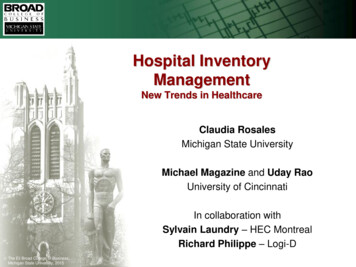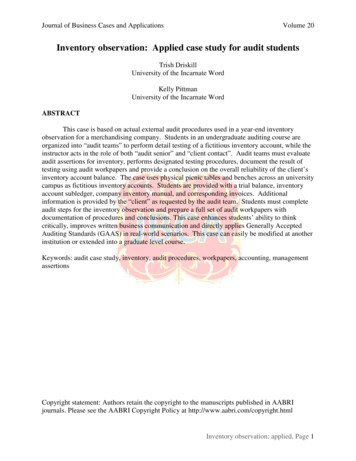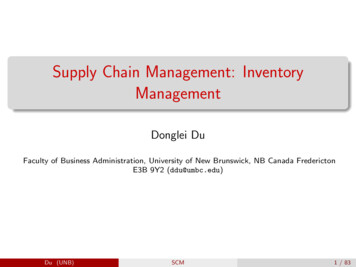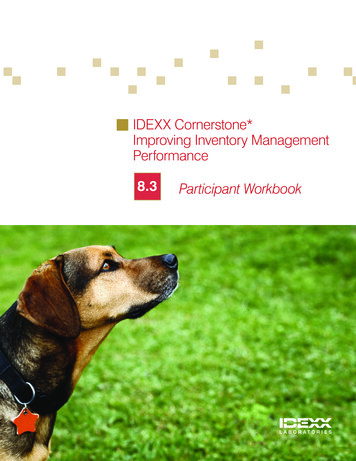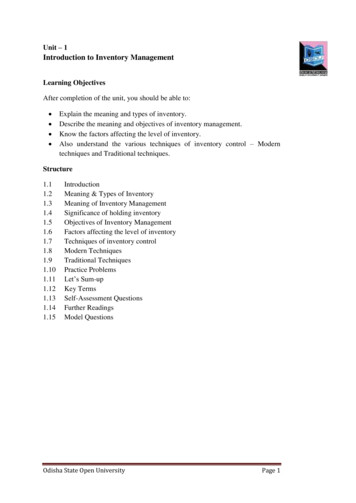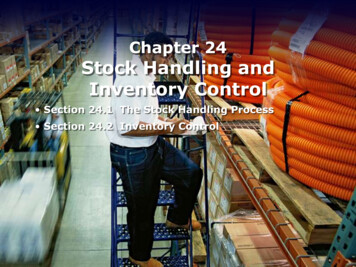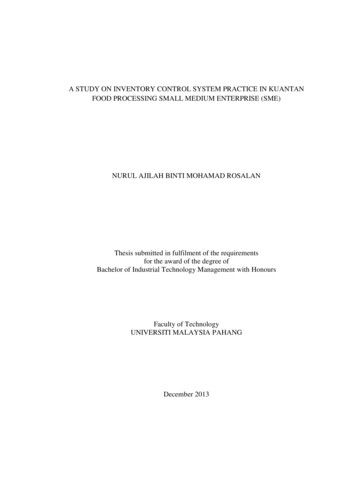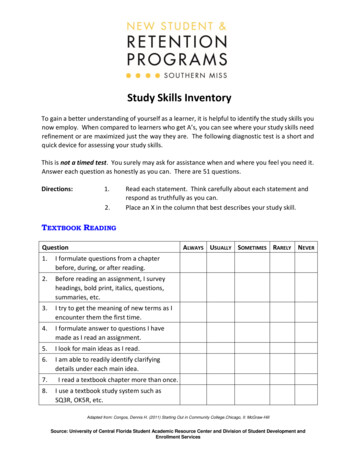
Transcription
Study Skills InventoryTo gain a better understanding of yourself as a learner, it is helpful to identify the study skills younow employ. When compared to learners who get A’s, you can see where your study skills needrefinement or are maximized just the way they are. The following diagnostic test is a short andquick device for assessing your study skills.This is not a timed test. You surely may ask for assistance when and where you feel you need it.Answer each question as honestly as you can. There are 51 questions.Directions:1.2.Read each statement. Think carefully about each statement andrespond as truthfully as you can.Place an X in the column that best describes your study skill.TEXTBOOK READINGQuestionALWAYS USUALLY SOMETIMES RARELY NEVER1.I formulate questions from a chapterbefore, during, or after reading.2.Before reading an assignment, I surveyheadings, bold print, italics, questions,summaries, etc.3.I try to get the meaning of new terms as Iencounter them the first time.4.I formulate answer to questions I havemade as I read an assignment.5.I look for main ideas as I read.6.I am able to readily identify clarifyingdetails under each main idea.7.8.I read a textbook chapter more than once.I use a textbook study system such asSQ3R, OK5R, etc.Adapted from: Congos, Dennis H. (2011) Starting Out in Community College.Chicago, Il: McGraw-HillSource: University of Central Florida Student Academic Resource Center and Division of Student Development andEnrollment Services
NOTETAKINGQuestion9.ALWAYS USUALLY SOMETIMES RARELY NEVERI take notes as I read textbookassignments.10. I take notes in lectures.11. After taking notes, I review them beforeQuestionALWAYS USUALLY SOMETIMES RARELY NEVERgoing on to something else.12. I rewrite lecture notes.13. I compare notes with one or more otherstudents to check completeness andaccuracy.MEMORYQuestionALWAYS USUALLY SOMETIMES RARELY NEVER14. I review notes more than once or twice forexams and quizzes.15. I use mnemonics.16. I use visuals in my notes such as sketches,mind maps, diagrams, charts, etc.17. I quiz myself over material that couldappear on future exams and quizzes.18. I organize details to main ideas intonumbered or lettered lists.19. I convert text and lecture material into myown words.Adapted from: Congos, Dennis H. (2011) Starting Out in Community College.Chicago, Il: McGraw-HillSource: University of Central Florida Student Academic Resource Center and Division of Student Development andEnrollment Services
20. I think about material that could be onexams and quizzes when I am not studying.21. I try to understand material in my notes asopposed to memorizing.22. I try to organize main ideas and details intosome logical or meaningful order.TEST PREPARATIONQuestionALWAYS USUALLY SOMETIMES RARELY NEVER23. I study with a classmate or group.24. When I don’t understand something, I gethelp from classmates, tutors, instructors, SILeaders, etc.25. I do all homework assignments.26. I turn in homework assignments on time.27. I can easily identify what I have learned andwhat I have not yet learned before I take atest.QuestionALWAYS USUALLY SOMETIMES RARELY NEVER28. I review notes for a class before I go to thatclass.29. I read assigned material before I go to class.30. I begin studying for an exam from the firstweek material is assigned or covered inlecture.31. I review lecture notes soon after class.32. I keep up to date on assignments andhomework.33. I eat well-balanced meals daily.Adapted from: Congos, Dennis H. (2011) Starting Out in Community College.Chicago, Il: McGraw-HillSource: University of Central Florida Student Academic Resource Center and Division of Student Development andEnrollment Services
34. I exercise daily.35. I have taken a learning skills class orattended learning skills workshops.CONCENTRATIONQuestionALWAYS USUALLY SOMETIMES RARELY NEVER36. I study where it is quiet when trying to learnand remember something.37. I study for a length of time then take a shortbreak before returning to studying.38. I study in the same place.39. I avoid cramming.40. I have all my study equipment handy to mystudy place (pens, paper, calculator, etc.)41. When I sit down to study, I tell myself that Iintend to study.42. I break larger tasks into smaller segments inorder to complete a large assignment.43. When the subject matter in not naturallyinteresting, I find ways to learn it anyway.44. It is not difficult to pay attention in class.45. I avoid studying in the evenings.TIME MANAGEMENTQuestionALWAYS USUALLY SOMETIMES RARELY NEVERAdapted from: Congos, Dennis H. (2011) Starting Out in Community College.Chicago, Il: McGraw-HillSource: University of Central Florida Student Academic Resource Center and Division of Student Development andEnrollment Services
46. I use a calendar book for recording dailyand weekly upcoming academic andpersonal activities.47. I use lists such as daily “to do” lists,assignment lists, etc. to organize academicand personal activities.48. I set up a master schedule of fixed monthlyactivities such as work, club meetings, etc.49. I write out short-term and long-termacademic goals.50. I start papers and projects way before theyare due.51. I study at least 2 hours for every hour I amin class.Go to the next page to add up your scores.Adapted from: Congos, Dennis H. (2011) Starting Out in Community College.Chicago, Il: McGraw-HillSource: University of Central Florida Student Academic Resource Center and Division of Student Development andEnrollment Services
Student Academic Resource CenterStudy Skills Inventory ScoringFor each statement, find the point value for each of your responses and place it on the line next to the correspondingstatement number below. Next, total each of the columns to determine your study skills efficacy score.Always 5 points Usually 4 points Sometimes 3 points Rarely 2 points Never 1 pointSTUDY SKILLS EFFICACY SCORESTEXTBOOKSNOTETAKINGMEMORYTEST PREPCONCENTRATION TIME MGMTQuestionNumber PointsQuestionNumber PointsQuestionNumber PointsQuestionNumber PointsQuestionNumber PointsQuestionNumber Textbook SkillsScore:Less than a score of30 suggests changesin textbook readingskills are likely toincrease your gradesNotetaking SkillsScore:Memory SkillsScore:Less than a score of20 suggests changesin notetaking skillsare likely to increaseyour gradesLess than a score of30 suggests changesin memory skills arelikely to increase yourgradesTest Prep. SkillsScore:Less than a score of40 suggests changesin test preparationskills are likely toincrease your gradesConcen. SkillsScore:Less than a score of35 suggests changesin concentration skillsare likely to increaseyour gradesTime Mgmt. SkillsScore:Less than a score of20 suggests changesin time managementskills are likely toincrease your grades
Now, list the study skills below with which you are most likely to increase your grades if you make changes:Adapted from: Congos, Dennis H. (2011) Starting Out in Community College.Chicago, Il: McGraw-HillSource: University of Central Florida Student Academic Resource Center and Division of Student Development and Enrollment Services
Study Skills Inventory To gain a better understanding of yourself as a learner, it is helpful to identify the study skills you now employ. When compared to learners who get A's, you can see where your study skills need refinement or are maximized just the way they are. The following diagnostic test is a short and
